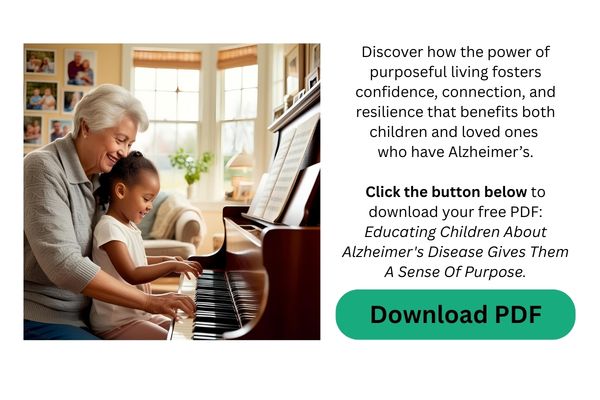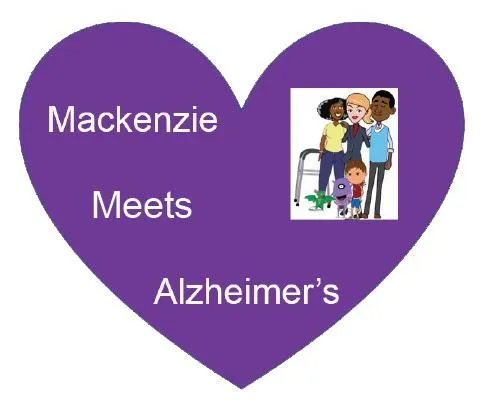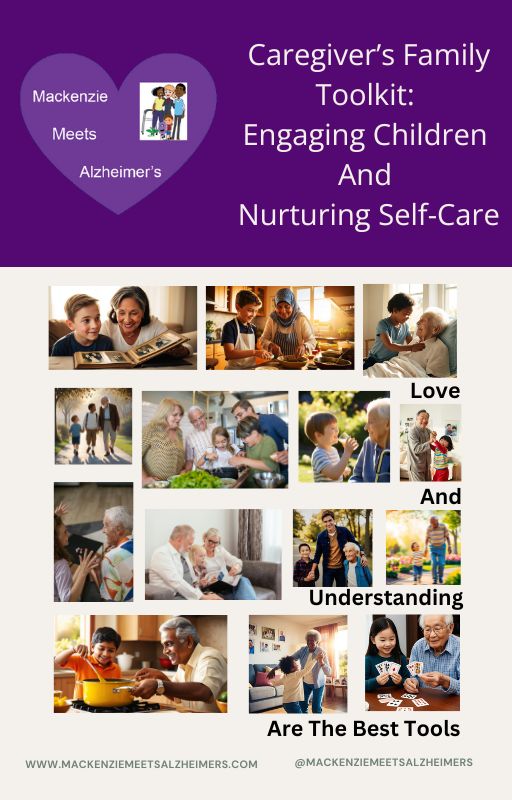
Educating Children about Alzheimer's Disease Gives Them a Sense of Purpose
Story: Alder’s Mom, Jean, was first diagnosed with Alzheimer’s disease when she was in a rehabilitation facility following a back operation. Jean became very despondent. The two grandchildren were invited to visit the facility and participate in therapy with Jean. The immediate joy and spark of life the grandchildren brought to their Gran increased her motivation in therapy, and her joy for life.
Alder educated her niece (age 7) and nephew (age 5) about Alzheimer’s disease and how it was affecting their Gran’s brain. They wanted to help their Gran. The children started to brainstorm ways they could help her. Alder watched to see if her niece and nephew would follow through. They did. In turn, Alder’s mom wanted to be an active part of their lives, and the interactions gave her purpose, too.
Information:
Dictionary.com defines purpose as: “the reason for which something exists or is done.” It’s in our serving of others and ourselves that we develop purpose, and with it, confidence and positive self-esteem.
Psychologists have researched the benefits of having a purpose in life for several decades. In a 2019, meta analysis of the data on the benefits of Life Purpose by Michaéla C. Schippers and Niklas Ziegler https://pmc.ncbi.nlm.nih.gov/articles/PMC6923189/ found “The good news is that it is in principle never too late to find a purpose in life, although recent research suggests that it may be most beneficial to find a direction in life earlier rather than later.”
Kang Y., Strecher V. J., Kim E., Falk E. B. (2019) found that “People with a purpose in life are less likely to experience conflict when making health-related decisions and are more likely to self-regulate when making these decisions and consequently experience better (mental) health outcomes.”
Kim E. S., Strecher V. J., Ryff C. D. (2014). and Freedland K. E. (2019) found that “having a purpose in life can aid in overcoming stress, depression, anxiety, and other psychological problems.”
The question becomes how to assist your children and your loved one who has Alzheimer’s or any type of dementia in finding a meaningful purpose.
We’ve created a downloadable PDF available below, Educating Children about Alzheimer's Disease Gives Them a Sense of Purpose, with activities to educate children on the importance of purpose in their lives and the lives of their loved one who has Alzheimer’s or any type of dementia, and how to find and live that purpose.

Tips:
Look for strengths and abilities in both your children and your loved one with dementia.
Pay attention to how the child and your loved one act when they have a purpose and responsibility to each other; for example, when they’re helping each other prepare a snack.
Post purpose-filled goals in a place where the family can see them every day. The goals need to be measurable. We show you how to measure them in the downloadable PDF.
Living with purpose increases self-esteem and teaches a skill the child can apply throughout their life.
In Conclusion:
Finding and nurturing purpose isn’t just a lofty ideal—it’s a daily practice that can transform the lives of both children and loved ones living with Alzheimer’s or dementia. When families intentionally create moments of meaning, they build confidence, strengthen emotional resilience, and forge connections that last far beyond the challenges of the disease. By recognizing strengths, setting visible, measurable goals, and engaging in shared activities, you empower every family member to experience the joy and self-worth that comes from living with intention.
Our downloadable PDF, Educating Children about Alzheimer's Disease Gives Them a Sense of Purpose, offers practical age-appropriate ways to help your child and loved one discover and live their purpose—together. When purpose takes root in a family, it grows into hope, compassion, and lasting love. Download it here.
Ready to explore more about creating a nurturing environment for your child and your loved one with Alzheimer's or any type of dementia? Consider purchasing our Mackenzie Meets Alzheimer's Awareness Program. Learn more here.

